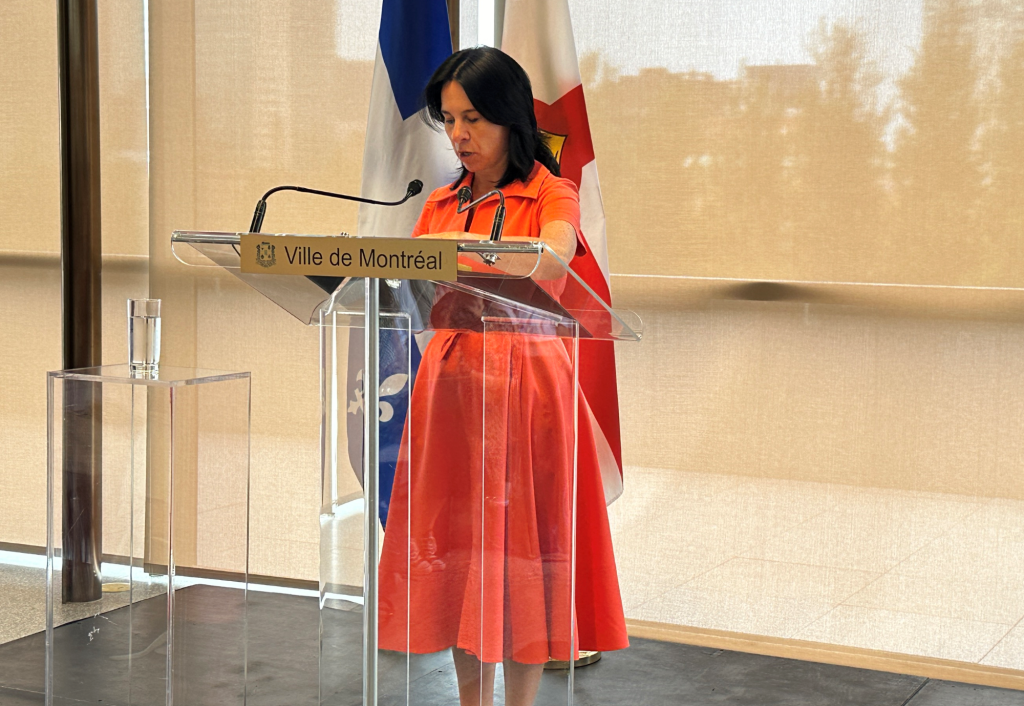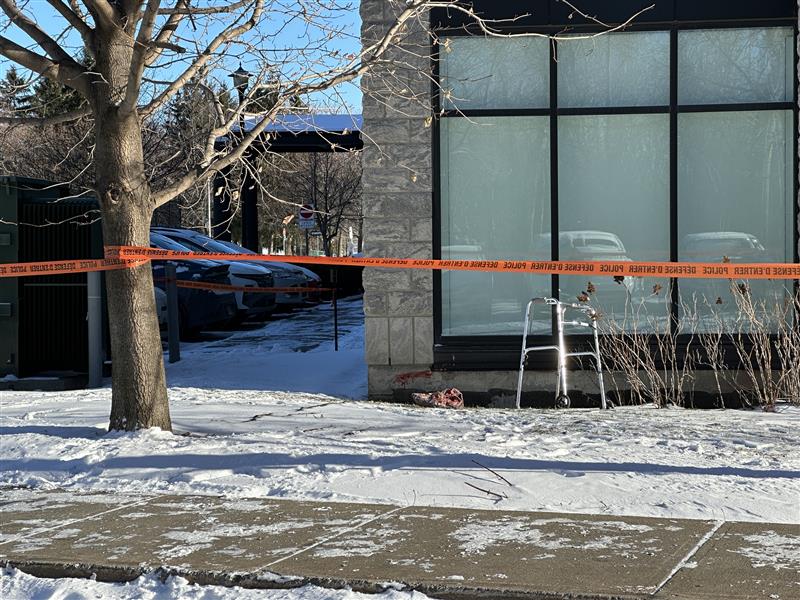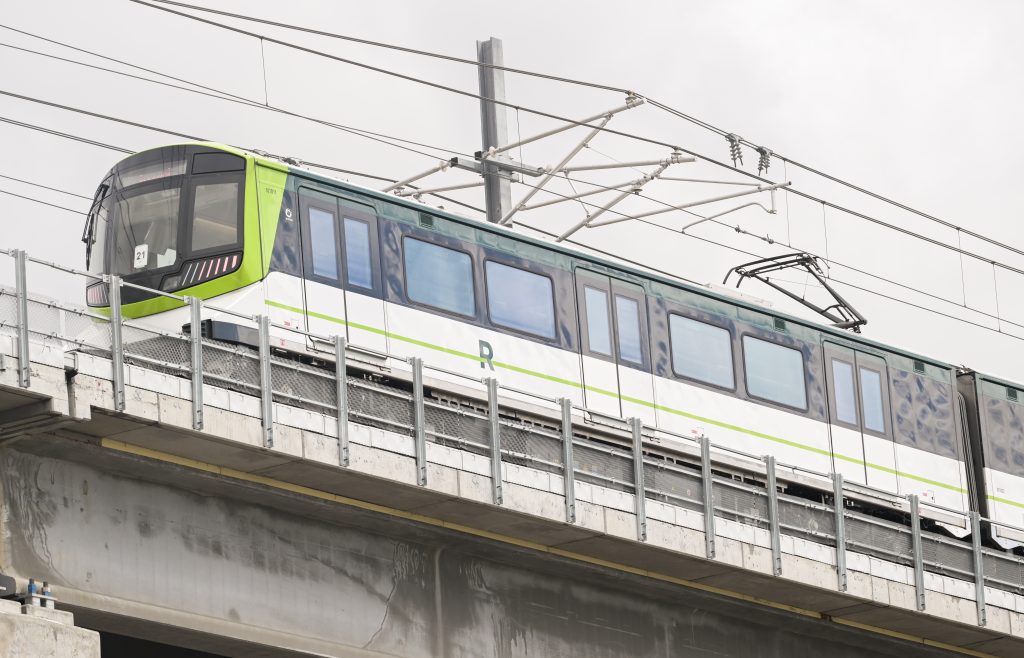Public consultations on homelessness, Montreal wants your input

Posted July 9, 2024 2:02 pm.
Last Updated July 9, 2024 6:20 pm.
The City of Montreal wants the public’s input when it comes to homelessness. They are launching a “major” consultation to find solutions in response to the worsening homelessness situation and a rise in complaints from residents.
The goal: to get the public’s opinions on how to live “harmoniously” with the unhoused population.
It will also involve community organizations.
“At a time when the homelessness crisis continues to grow and community organizations are under increasing pressure,” said the City in a press release.
They want to identify best practices and initiatives to support vulnerable people, as well as promote social cohabitation when setting up new resources and services, especially in boroughs that are not used to this reality, which many are seeing now.
On Tuesday, Mayor Valérie Plante made the announcement at City Hall, accompanied by Montreal public health director, Dr. Mylène Drouin. The Office de consultation publique de Montréal (OCPM) will be mandated to conduct the public consultations.

“We are seeing that more and more residents, parents, families and business owners are concerned about the way resources are planned in their area and we must do better in anticipation of increasing needs,” Plante said in a press release.
The 2022 provincial homeless survey found that about 4,690 people are experiencing homelessness in the Montreal region – up by 33 per cent compared to 2018. It also found that 800 people are visibly homeless on the streets of Montreal each night and they say the numbers are likely an underrepresentation of the actual situation.
Although resources for those experiencing homelessness have doubled since the COVID-19 pandemic, the city had received an influx of complaints.
“If we are to respond adequately to the growing needs of vulnerable people, all players must do more to better plan the opening of resources in neighbourhoods and take into account the needs of the population,” declared Plante.
Sarah Ethier, an unhoused woman in Montreal, says she’s skeptical about the city’s plan.
“Are you sure you’re going to do anything? Because they say yes this thing then all of a sudden, nope they don’t do nothing anymore,” she said.
Ethier was evicted from her home on July 1st after her landlord didn’t renew the lease. Since then, she’s been in and out of shelters and encampments, looking for a safe place to sleep.
“I’m worried, I don’t know what to do,” she said. “I’m scared.”
As a result of the issue, many homeless encampments have cropped up around the city and Ethier is living in the encampment called “Refus Local” in Parc-des-Faubourgs in the Centre-Sud district.
“We’re friendly, we try to get along with everybody but you can’t get along with everybody because a lot of people put their nose down on us,” Ethier said.
Plante has reiterated that the city would not tolerate these types of camps and police and city officials would work to dismantle them.
According to Le Journal, at least 110 homeless encampments have been dismantled in Montreal since the beginning of 2024 – nearly all of them located in the Ville-Marie borough, but some as far away as Pointe-aux-Trembles.
“The truth of the matter is that the vast majority of people who are experiencing homelessness are vulnerable but not dangerous,” said Sam Watts, CEO of Welcome Hall Mission. “And yet there’s this story that goes around every time that there’s one incident or two incidents, which is one or two too many, but this is a generalization of the entire population and that’s simply not the case.”
Perfect storm: housing crisis and increasing cost of living
Dr. Mylène Drouin says homelessness has increased, even though the number of shelter beds did, too. In 2018, there were 900 spots and in 2022, there were 1,600.
She called the housing crisis and the increasing cost of living a “perfect storm,” adding that there are also new drugs circulating on the streets.
“As a consequence of the housing crisis, visible homelessness is on the rise and evolving in Montreal. It’s a complex, multi-faceted phenomenon, including residential precariousness, mental health issues, the overdose crisis and more. It is important to propose responses adapted to these different facets, while making sure to include the voice of the population, including that of marginalized people and those experiencing homelessness, in this consultation effort. Solutions must also be shared by a number of players, both community-based and institutional, if we are to overcome this public health crisis,” said Dr. Drouin.
The city has seen older people, gender diverse people and more women becoming unhoused as well. Those from Indigenous communities and the 2SLGBTQ+ communities, and those leaving youth protection, are overrepresented in the numbers when compared to the demographics of Montreal.
‘Too little, too late’
The public consultation is in line with two other initiatives launched by the City of Montreal this spring to bring together its partners and put in place the structures needed to curb the worsening homelessness crisis, but the Official Opposition is calling it “too little, too late.”
“Once again, it took the grumbling of many citizens and the unmanageable nature of cohabitation issues for the administration to wake up. Unfortunately, it’s too little too late,” said Benoit Langevin, Official Opposition Spokesperson on Homelessness, with Ensemble Montréal in a press release.
“It wasn’t until shelters were set up that the population had to be consulted. At this stage, Montrealers want concrete solutions. Projet Montréal should already have a clear action plan in place before the opening of each resource for people experiencing homelessness, as Ensemble Montréal has been calling for for years.”
The dates for the public consultation have not been set yet, but should be announced on the city’s website in the coming weeks. Not only residents, but those who have experienced homelessness are also invited to take part in the OCPM’s consultations.
The office is then expected to release a report with recommendations before next summer.
More resources being allocated
The city recently made permanent the multi-party crisis unit that had been created in winter 2023 to respond to the social problems experienced in the Village and Place Émilie-Gamelin area.
This new “Comité tactique pour les personnes vulnérables dans l’espace public” has been expanded to include the boroughs of Ville-Marie, Sud-Ouest, Plateau-Mont-Royal and Mercier-Hochelaga-Maisonneuve.
“Jointly piloted by the city and the health and social services network, it brings together community and institutional partners working to deploy solutions to help these vulnerable people find alternatives that will enable them to get off the street,” said the City in a press release.
The city has also set up an “ad hoc committee on the issues and needs of people who cannot access housing.”
The committee’s mandate is to bring together the expertise of institutional and community players to help homeless people gain access to services adapted to their reality, and to safer, more stable living conditions.
The committee’s work will be carried out from March to October 2024, and a report on the exchanges and orientations proposed by the various members of the expert group will be submitted in October 2024.








